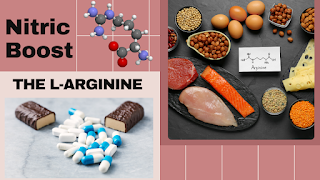L-Arginine
It is an amino acid that plays a crucial role in various physiological processes within the human body. It is classified as a semi-essential amino acid, meaning that while the body can produce it, there are certain conditions under which its external intake becomes essential. This blog aims to provide a detailed overview of L-Arginine, focusing on its structural characteristics, dietary sources, and its diverse benefits in cardiovascular health, hormonal regulation, sports performance, and overall physiological well-being.
1. Structure and Dietary Sources:
L-Arginine is one of the 20 amino acids that make up proteins in the human body. Its molecular structure consists of a central carbon atom bound to hydrogen, amino group, carboxyl group, and a side chain containing a guanidino group. The amino acid is classified as basic due to the presence of the amino group.
Primary dietary sources of L-Arginine include protein-rich foods such as meat, poultry, fish, dairy products, nuts, seeds, and legumes. Additionally, some individuals opt for L-Arginine supplements to meet specific health or performance goals.
2. Cardiovascular Benefits:
L-Arginine is a precursor to nitric oxide (NO), a potent vasodilator that relaxes blood vessels, promoting improved blood flow. This vasodilation contributes to the maintenance of healthy blood pressure levels and enhances overall cardiovascular function. Additionally, L-Arginine has been studied for its potential to improve endothelial function, reducing the risk of atherosclerosis and cardiovascular diseases.
3. Hormonal Regulation:
L-Arginine plays a role in the synthesis of various hormones, including insulin, growth hormone, and prolactin. Its involvement in hormone production makes it relevant to metabolic processes, growth, and overall endocrine balance. Some studies suggest that L-Arginine supplementation may positively impact hormonal profiles, especially in individuals engaged in regular physical activity.
4. Sports Performance:
Athletes and fitness enthusiasts often turn to L-Arginine for its potential to enhance exercise performance. The vasodilatory effect of nitric oxide, derived from L-Arginine, may improve blood flow to working muscles, leading to increased nutrient delivery and oxygenation. Additionally, L-Arginine is involved in the synthesis of creatine, a compound crucial for energy production during short bursts of intense physical activity.
5. Physiological Benefits:
Beyond its role in cardiovascular health, L-Arginine has
been associated with various physiological benefits. It contributes to immune
function, wound healing, and the removal of waste products from the body.
L-Arginine's anti-inflammatory properties further support its role in
maintaining overall physiological balance.
The health benefits of L-Arginine extend to conditions such as erectile dysfunction, where its role in promoting vasodilation may have a positive impact. Moreover, L-Arginine supplementation has been explored in the context of managing certain metabolic disorders and supporting overall well-being.
In conclusion, L-Arginine is a multifaceted amino acid with
significant implications for cardiovascular health, hormonal regulation, sports
performance, and overall physiological well-being. Its diverse benefits make it
a subject of interest in both scientific research and practical applications,
with potential implications for various aspects of human health and
performance. As with any supplement, it is crucial for individuals to consult
with healthcare professionals before incorporating L-Arginine into their
regimen, especially if there are pre-existing health conditions or concerns.
